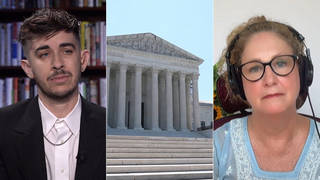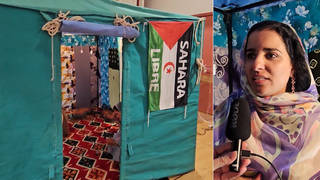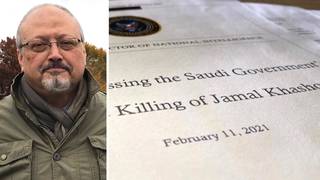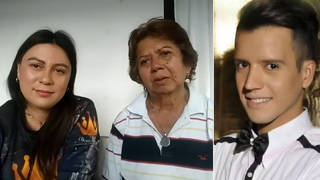
Guests
- Medea Benjaminco-founder of CodePink.
- Mehdi Hasancolumnist for The Intercept and host of their Deconstructed podcast. He’s also host of UpFront at Al Jazeera English.
Fears are growing over the fate of missing Saudi journalist Jamal Khashoggi, who Turkish officials say they believe was murdered in the Saudi Consulate in Istanbul last week. Khashoggi, a columnist for The Washington Post who had been living in self-imposed exile in the United States, entered the Saudi Consulate in Turkey seeking a document he needed to get married and has not been seen since. The Washington Post reports a Turkish investigation has revealed that a group of about 15 Saudi men traveled to Istanbul to kill Khashoggi as he visited the consulate. Saudi officials have denied the report and say they don’t know the journalist’s whereabouts. Khashoggi is a critic of the Saudi regime. “This is a horrific escalation in the crown prince’s campaign to silence dissent, to silence any criticism, even the mildest of criticism, from Saudis at home or abroad,” says columnist for The Intercept Mehdi Hasan, who is also host of “UpFront” at Al Jazeera English, where he interviewed Khashoggi earlier this year. We’re also joined by Medea Benjamin, co-founder of CodePink, who knew Khashoggi and is the author of “Kingdom of the Unjust: Behind the U.S.-Saudi Connection.”
Transcript
AMY GOODMAN: This is Democracy Now! I’m Amy Goodman. Fears are growing over the fate of missing Saudi journalist Jamal Khashoggi, who Turkish officials say they believe was murdered in the Saudi Consulate in Istanbul, Turkey, last week. Khashoggi was a columnist for The Washington Post. He’s been living in self-imposed exile in the United States. He entered the Saudi Consulate in Turkey seeking a document he needed to get married and has not been seen since.
The Washington Post reports a Turkish investigation has revealed a group of about 15 Saudi men traveled to Istanbul to kill Khashoggi as he visited the consulate. Saudi officials have denied the report and say they don’t know the journalist’s whereabouts. In an interview with Bloomberg last week, the Saudi crown prince, Mohammed bin Salman, said the Saudis were very keen to know what happened to Khashoggi and would allow Turkish officials to enter the Saudi Consulate and search the premises. But when he was pressed about whether Khashoggi faces charges in Saudi Arabia, he evaded the question. Khashoggi is a well-known critic of the Saudi regime.
Democratic Senator Chris Murphy of Connecticut tweeted Sunday, “If this is true–that the Saudis lured a U.S. resident into their consulate and murdered him–it should represent a fundamental break in our relationship with Saudi Arabia,” unquote.
Well, last week, The Washington Post printed a blank column in support of Khashoggi. It was titled “A missing vote [sic],” with just his byline—”A missing voice” was the headline.
Our next guest is Mehdi Hasan, who interviewed Jamal Khashoggi in Washington, D.C., earlier this year.
MEHDI HASAN: You’ve compared your crown prince to Putin, to Iran’s supreme leader. You’ve said he’s creating, quote, “an interesting form of dictatorship.” How so?
JAMAL KHASHOGGI: I still see him as a reformer, but he is gathering all power within his hand. And it would be much better for him to allow a breathing space for critic, for Saudi intellectuals, Saudi writers, Saudi media to debate the most important needed transformation going in the country. What he is doing, I called for, and I got fired for, when I was an editor of a newspaper—allowing women to drive or for women to be empowered or to limit the power of the religious establishment. I demanded that. And he is doing the right things. But it is an important transformation that requires all of us to contribute to it, to discuss it, and no one should be jailed.
AMY GOODMAN: We go now to Washington, D.C., where we are joined by Mehdi Hasan, who was interviewing Jamal Khashoggi. Mehdi is a columnist for The Intercept, host of their Deconstructed podcast. He is the host of UpFront at Al Jazeera English, where Jamal was speaking. Also with us, Medea Benjamin, co-founder of CodePink, who knew Khashoggi and is the author of Kingdom of the Unjust: Behind the U.S.-Saudi Connection.
We welcome you both to Democracy Now! Mehdi, talk about the latest news and what we understand at this point has happened to Jamal Khashoggi.
MEHDI HASAN: So, over the weekend, Amy, we had Turkish government officials and police officers and advisers to Erdogan, the president, leaking and, you know, stating to the media that this Saudi kill team, this assassination team, came from Saudi Arabia, 15 of them allegedly, to the consulate, where Jamal Khashoggi entered last Tuesday to get this documentation for his marriage, with his fiancée waiting outside, and allegedly killed him inside the consulate. There’s reports that his body may have been cut up and taken out of the embassy in boxes in a car. It’s horrific stuff that we’re hearing about.
The Saudis deny all of this, of course, although their denial isn’t worth much. And interestingly, the consulate took a group of, I think, Reuters journalists over the weekend around the consulate, the six floors, opening the doors of closets, very ostentatiously, to show that he’s not in the building, he’s not here, he left. And yet, funnily enough, their CCTV wasn’t working, apparently, the day he came in, so they’ve got no video footage of him leaving. How convenient, Amy.
I mean, look, the Saudis are involved in the disappearance of Jamal Khashoggi, if, God forbid, he’s dead, as it’s looking very likely. It’s been several days now with no proof of life. This is a horrific escalation in the crown prince’s campaign to silence dissent, to silence any criticism, even the mildest of criticism, from Saudis at home or abroad. It’s deeply worrying, deeply concerning. And the world shouldn’t sit silently by, although I suspect they will.
AMY GOODMAN: Mehdi Hasan, talk about who Jamal Khashoggi—I don’t even know whether to say “is” or “was.”
MEHDI HASAN: Yeah. He was one of the most prominent Saudi voices, journalists. Everyone in the Western media knew him. He was the access point for the Saudi royal family for a long time. He was an adviser to Saudi royals like Turki bin Faisal, who was ambassador to the U.S., former Saudi intelligence chief. He was adviser to Waleed bin Talal, a very prominent, wealthy Saudi businessman and prince. He had appeared on many TV shows, not just mine, was well known here in Washington, D.C., where he moved in 2017, when he felt that the new crown prince, Mohammed bin Salman, MBS, wasn’t letting him speak freely on Twitter, wasn’t letting him write articles.
And he wasn’t an opposition figure. People are calling him a dissident. He wasn’t a dissident. He supported Saudi Arabia. He supported the Saudi royal family. What he didn’t like was MBS’s autocracy, even by the standards of autocratic Saudi rulers. And he said it on my show. He said, “Look, I’m not calling for elections. I’m just saying let me write some pieces. Let me be a journalist. Let people in Saudi Arabia say what they want to say, even if they’re, you know, mildly critical.”
And it just goes to show how how thin-skinned MBS is, that someone like Jamal Khashoggi, who is a member of the Saudi establishment, is not calling for elections, is just saying, you know, “Let’s have some better reforms, let’s all be part of this reform project that you claim to be leading”—if even he’s seen as a threat, and if even he’s seen as someone who can be taken out, assassinated, extrajudicially killed in a foreign country, what does that say about, A, MBS and how thin-skinned he is, how intolerant he is, and, B, what does that say for Saudis around the world who want to be critical of their country? What does that say about journalists now?
We live in a year, Amy, where journalists are being killed in astonishing numbers, a Bulgarian journalist brutally murdered and raped over the weekend. And that’s why people need to say something about this. But, you know, we know—Amy, you and I have discussed on the show—the Saudis get a pass. And MBS is now behaving like Colonel Gaddafi, and he’ll still get a pass.
AMY GOODMAN: And, of course, MBS, Mohammed bin Salman, very close to Jared Kushner, the son-in-law and senior adviser to President Trump. Has the White House said anything about what has happened right now to Jamal Khashoggi?
MEHDI HASAN: They’re saying that they’re following the story, which is their way of saying, “We don’t really want to say anything.” Trump and Kushner are very close to MBS. They backed him from the very beginning as he took out rival members of his family and took basically control of that kingdom. Trump was saying last week how much he loved the Saudi king; he just wanted them to pay more for their defense, because they relied on the U.S. They’re not going to say anything.
Look, the Canadians, Amy, a few weeks ago, put out a mild tweet criticizing the detention of women’s right activists in Saudi Arabia. The Saudis, who can’t handle any criticism, went crazy and chucked out the Canadian ambassador, launched an online campaign attacking Canada. And where was the rest of the world? Where was the U.S. when these two allies were having a row? They basically said, “We’re staying out of it.”
And I suspect if the Turkish government, who have their own problems with Saudi Arabia, escalate this matter and start making more public accusations about the Saudis’ role in the killing of a Saudi citizen on Turkish soil, then I suspect the Americans will try and stay out of it, as well, because they don’t want to upset the Saudis.
AMY GOODMAN: Last week, President Trump praised Saudi Arabia and its ruler, King Salman, but said the monarchy would quickly collapse without U.S. support. Trump was speaking Tuesday at a campaign rally in Mississippi.
PRESIDENT DONALD TRUMP: We protect Saudi Arabia. Would you say they’re rich? And I love the king, King Salman, but I said, “King, we’re protecting you. You might not be there for two weeks without us. You have to pay for your military. You have to pay.”
AMY GOODMAN: So, that was President Trump speaking in Mississippi. I want to bring Medea Benjamin in, co-founder of CodePink, author of Kingdom of the Unjust: Behind the U.S.-Saudi Connection. You also knew Jamal Khashoggi. Can you talk about what’s happened to him and what’s happening with the U.S.-Saudi relationship?
MEDEA BENJAMIN: We don’t know what happened to him. But if indeed it turns out that he was murdered inside the Saudi Consulate, this has to be a turning point. He is somebody who worked in the United States, a resident of the United States, worked for The Washington Post. He is a well-known journalist, a mild critic, part of the loyal opposition. If they could do this to him, it’s outrageous.
And I think it has to be put in the context that the Saudi—the crown prince, MBS, is out of control—what he is doing in Yemen, the bombing of schoolchildren, the kidnapping of Hariri in Lebanon, the throwing in prison of women activists, of scholars. He is creating an economic war with Qatar. He’d like to see the U.S. go to war with Iran. He is out of control. And at some point we’ve got to break relations with Saudi. It’s just all—so much of this is about weapons sales, and we’ve got to say that the weapons companies can’t control our policy.
I was heartened to see over the weekend some tweets, not just by people like Chris Murphy, who has been good on this issue, but also by Marco Rubio. We need our senators, our congresspeople to say, “Enough is enough.” If indeed this is true, there have to be severe consequences, sanctions against the Saudis, and it has to be the beginning of a break in our relationship with Saudi Arabia.
AMY GOODMAN: Reuters reported this morning, Turkey has asked for permission to search Saudi Arabia’s Consulate in Istanbul after the Saudi journalist Jamal Khashoggi went missing last week. Jamal Khashoggi’s fiancée, his Turkish fiancée, Hatice Cengiz, the reason he went into the embassy, accompanied him to the Saudi Consulate in Istanbul. She waited for him outside until after midnight, returning on Wednesday morning. She tweeted Saturday she wouldn’t believe anything until she receives official confirmation, writing, “Jamal was not killed, and I do not believe he was killed.” Now, the Turkish authorities say they see from closed circuit around—it’s a very busy area around the consulate—they see that he went in. They don’t see him coming out. Medea?
MEDEA BENJAMIN: Well, it certainly seems like he was killed inside the embassy. Fifteen people—the consulate. Fifteen people came in. The Turks know they flew in. They flew right out afterwards. They have footage of these 15 people. They have footage of the cars. They are going to be making statements very soon. I mean, we need to get the facts out, but I think, after all of these days, we can recognize that the Saudis have brought in a hit team to get rid of a critic—again, a mild critic.
And as Hasan Mehdi said, what does this mean to journalists? What does this mean to Saudis who are living in exile? What does this mean to Saudis who are living here in the United States? They are full of fear. I have friends here; they are afraid for their lives. So, something has to be done to get at the truth, but also something about accountability and U.S.-Saudi relations.
AMY GOODMAN: Mehdi Hasan, I wanted to ask you about Senator Murphy’s tweet. Again, he says, “If this is true–that the Saudis lured a U.S. resident into their consulate and murdered him–it should represent a fundamental break in our relationship with Saudi Arabia.” Your final response, also about what he last said to you?
MEHDI HASAN: Well, I’m glad Senator Murphy said that. I interviewed him recently in my podcast, and he wasn’t willing to say that Saudi Arabia wasn’t an ally, in the way that Bernie Sanders has, for example. But I think, you know, the direction is shifting. Medea is right to mention Marco Rubio, as well.
But, you know, what are the liberals going to say? It’s very easy to blame Trump. Where—you know, MBS came to America and was fêted and met with Bezos, the owner of The Washington Post, met Zuckerberg and Bill Gates, and all these people were falling over to meet him. You know, Dwayne “The Rock” Johnson. Are any of them going to say anything now about this?
I mean, my heart goes out to his fiancée. It’s horrible news. And when I last saw Jamal, we were joking in the green room at Al Jazeera about his personal security, MBS being in town: Did he feel safe? But here’s a person who wrote in his columns for The Washington Post that, you know, “I have a voice that people in Saudi Arabia don’t have, and I’m going to use it.” And he did, at great personal risk. He knew the risks, but I don’t think even he thought this would happen last week when he went into the consulate.
But, you know, if the Saudis have murdered a Washington Post columnist on foreign soil and the United States government and the United States media stays quiet, I think that will be just astonishing.
AMY GOODMAN: Well, I want to thank you both for being with us to talk about this. The Washington Post, of course, also calling this an attack on journalism, demanding answers for their columnist. We will continue to follow the case of Jamal Khashoggi. Medea Benjamin and Mehdi Hasan, thanks so much for joining us. That does it for our broadcast. I’m Amy Goodman. Thanks for joining us.













Media Options